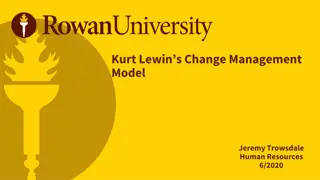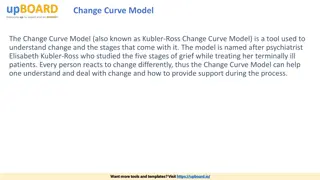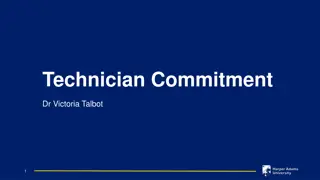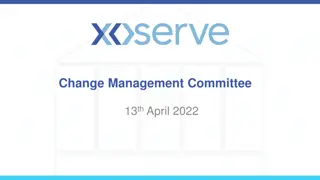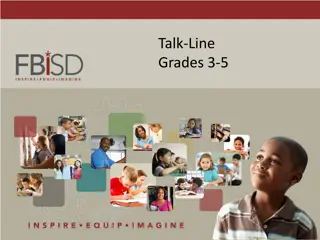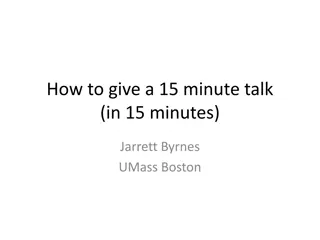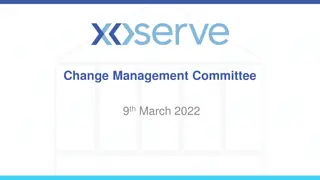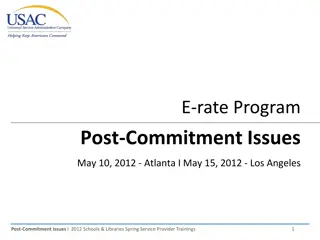Strengthening Commitment and Change Talk
This content delves into evoking commitment, exploring change talk, and providing strategies to enhance commitment levels. It discusses desire, ability, reasons, need, and commitment in driving change and showcases examples of change and sustain talk. The importance of following change talk with OARS (Open-ended questions, Affirmations, Reflective listening, and Summarizing) is highlighted to facilitate meaningful conversations. Ultimately, it aims to inspire individuals to embrace positive changes in their lives effectively.
Download Presentation

Please find below an Image/Link to download the presentation.
The content on the website is provided AS IS for your information and personal use only. It may not be sold, licensed, or shared on other websites without obtaining consent from the author.If you encounter any issues during the download, it is possible that the publisher has removed the file from their server.
You are allowed to download the files provided on this website for personal or commercial use, subject to the condition that they are used lawfully. All files are the property of their respective owners.
The content on the website is provided AS IS for your information and personal use only. It may not be sold, licensed, or shared on other websites without obtaining consent from the author.
E N D
Presentation Transcript
EVOKING AND STRENGTHENING COMMITMENT Module 5
HOW TALK LEADS TO CHANGE Which leads to: Then they talk about: People talk about: Desire Ability Reasons Need Change Commitment
Desire: Want, wish, like(I want to do better about keeping my stuff organized. ) Ability:Can, could, would ( I guess I could start keeping track of how much I m drinking. ) Reasons:If, then ( When I stick to a schedule, it helps keep things straight. ) Need:Need, have to, got to ( I ve got to figure out what I m doing after the Army. ) Commitment: Will, going to ( I ll spend more time on it this week. ) SOME EXAMPLES OF CHANGE TALK
Ive got to improve my performance. My time is dragging down the whole unit. More Likely to Change I ll practice some more this week. It s not that big a deal. Nothing really happens if you re behind. I m a long way from failing . Less Likely to Change I have too much to do to practice.
I cant get here any earlier. Traffic at the gate is terrible. I m willing to put in the work. I want my time in the Army to mean something. My drinking s not a big deal. I ve got it under control. I m coughing a lot more than I used to. I know it s the smoking. IS THIS SUSTAIN TALK OR CHANGE TALK? I quit smoking for a long time after my daughter was born. I m planning to use the GI Bill to finish college when I get out. It s a pretty good deal. Four years seems like forever. I don t know how I m going to do it. I ve been taking classes online in the evening. I want to finish my associate s degree before I get out.
FOLLOW CHANGE TALK WITH OARS Soldier Says: Leader Says: I want to do better about keeping my stuff organized. What would that look like? That s a great idea. I guess I could start keeping track of how much I m drinking. So sticking to a schedule would things more predictable. When I stick to a schedule, it helps keep things straight.
If I get to sleep on time, the mornings aren t too bad.
Ive got to figure out a way to lose 15 pounds. It s like carrying around a second pack.
I guess I could write down the steps. That might help me remember.
I want to do a better job communicating with my girlfriend. I know it s hard on her.
EXAMPLE: RECOGNIZING CHANGE TALK It s causing blisters in my lip (Reason) Also my health as well (Reason) I really want to quit (Desire) It s just going to cause problems down the road (Reason) https://youtu.be/k9HBZqJ_ASs
EXAMPLE: MOVING FROM SUSTAIN TALK TO CHANGE TALK When I quit, it hit me hard. I don t want to fall into a depressed state. All my friends smoke Not smoking is a success. It s a good feeling. My concentration is better.
WHERES THE CHANGE TALK? I can definitely lose my temper at times, and that s on me. I just wish Garza would stay out of my way. He s a punk! Recognizes his temper causes problems Wants other Soldier to act differently Thinks other Soldier has problems
SOME RESPONSES TO THE CHANGE PART Open Question Affirm What are some things you could do to keep your head down when things get out of control? You re trying to be smart about this, and to do what you can to stay out of trouble. So part of this is in how you re responding to him. [single sided] Reflect You feel like he picks on you, and you also recognize that you can have a thin skin at times. [double sided] Summarize So let me summarize and see if I have this right [summarize most important elements]
THE DOUBLE-SIDED REFLECTION: PUT THE CHANGE TALK LAST Leads to SUSTAIN Talk Leads to CHANGE Talk You d like to quit smoking, but you re afraid you might gain weight. You d like to talk to your girlfriend about this, but every time you bring it up, it just results in a big argument. Even though you might gain weight, it sounds like you d like to quit smoking. You could follow with: How would you do that? What s your first step? What are your options? Even though it s resulted in some arguments, it sounds like you recognize it s one of those things you ve just got to talk through.
If I get to sleep on time, the mornings aren t too bad. But someone s always up late playing video games. I lose track of time.
Ive got to figure out a way to lose 15 pounds. It s like carrying around a second pack. But the Army sure doesn t make it easy with the kind of food they serve.
Theres nothing to do here. If I didn t smoke, I d be bored out of my skull. It probably affects my PT a bit, but I m a long way from failing.
I want to do a better job communicating with my girlfriend. I know it s hard on her. But every time I bring it up, we just get into an argument.
Think about a behavior you might change (losing weight, drinking water, quitting smoking, getting better sleep, etc.). Write down an answer to these questions: 1. I would like to make that change because ____________. a. CHANGE TALK BATTING If I made that change, one benefit would be ____________. b. If I decided to make that change, the first thing I would do is ___________. c. CAGE Form a group of 4 people. 2. Each person should take turn reading their statements, one at a time, to the other people in the group. 3. Each other person should respond to the statement with an open question, affirmation, or reflection. 4.
CHANGE TALK BATTING CAGE DEBRIEF What kind of change talk statements did you write down? Which responses made you want to talk more about change?
Form a group of three people: a speaker, an interviewer, and a recorder. The speaker should think about a behavior he/she is interested in changing (losing weight, drinking water, quitting smoking, getting better sleep, etc.). The interviewer should spend 5 minutes interviewing the speaker about their thoughts and ideas about that behavior. Try to elicit change talk around desire, ability, reasons, need, and commitment to change. The recorder should keep track of any change talk they hear from the speaker. At the end of 5 minutes, switch roles. 1. 2. FOCUS ON CHANGE TALK 3. 4. 5.
FOCUS ON CHANGE TALK DEBRIEF What s one thing the interviewer said that was helpful to the speaker? What kinds of change talk did you notice?
MODULE 5 DEBRIEF Write down one thing you learned in this module that stands out
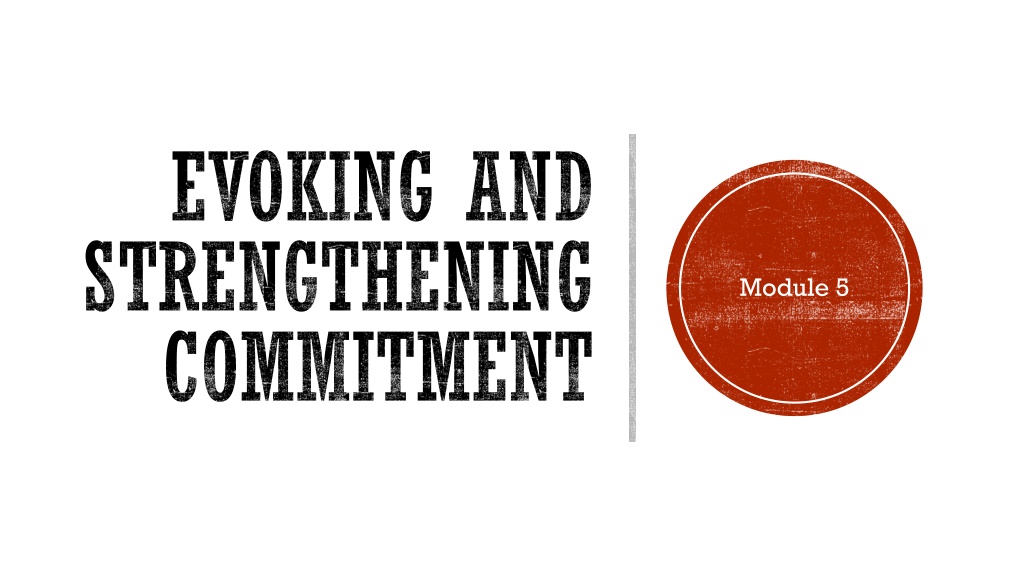
 undefined
undefined











